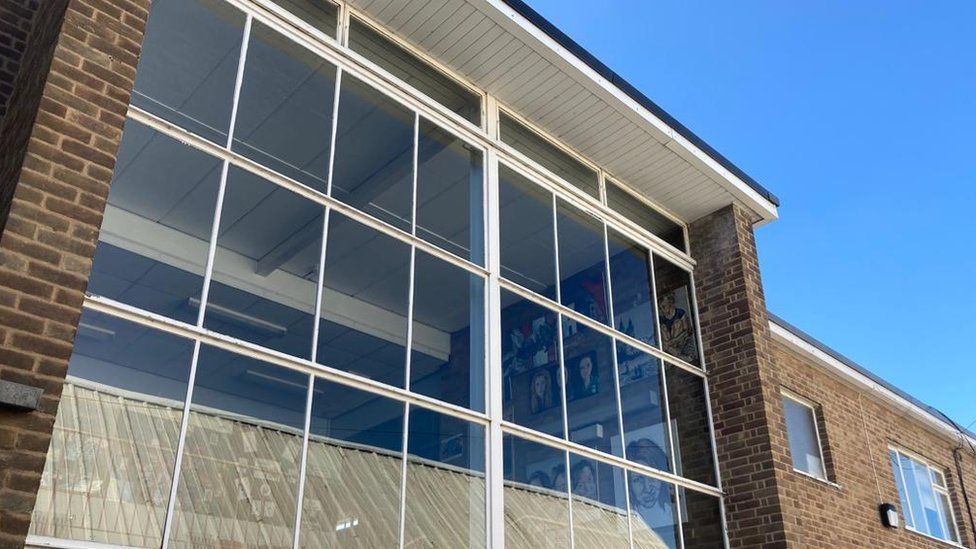
The rectangular roof panels in Myton School’s library contain RAAC
A head teacher who has had to delay the start of term because one of his school buildings contains dangerous concrete was denied funding to rebuild it.
“Other schools had a higher need”, the Department for Education (DfE) told Myton School, in Warwick, last year, when its application was rejected.
It is now one of dozens unable to open as normal because of reinforced autoclaved aerated concrete (RAAC), which is prone to collapse.
The DfE has been contacted for comment.
‘In disrepair’
Myton, which has about 1,800 pupils, now receives about £35,000 a year in capital funding to spend on building maintenance – less than a quarter of the funding received in 2010, head teacher Andy Perry says.
Its two main buildings, built in the 1950s or 1960s, are “old and in disrepair”, so he applied for extra cash from the government’s School Rebuilding Programme.
But a letter from the Department for Education, seen by BBC News, rejected the application because other schools were in worse condition.
Since then, a structural engineer has confirmed RAAC panelling in the first floor of the lower-school building, which has maths, languages, art and drama classrooms, a medical room and the canteen.
And last week, the government announced all schools with RAAC would have to close or partially close without safety measures in place, leading head teachers across England to scramble to make other arrangements days before the new term began.
Mr Perry told BBC News he and his staff felt “a lot of frustration” having to delay the start of term by three days.
“I don’t know how they make these decisions – but the fact I’ve got to close down or at least partially close down a block in a building that we bid to rebuild… it doesn’t feel like the parts of the DfE are particularly joined up here,” he said.
Image source, Myton School
Mr Perry says he is still waiting for the DfE to tell him how much of the building is unsafe
The DfE’s advice about what to do next was unclear, Mr Perry said. And he does not know whether the whole of the affected building will need to close or just the first floor.
But at the time of writing, Mr Perry was “still waiting” for a call from the DfE, despite being told he would be contacted on Monday.
“Honest to God, I thought we’d get a call or contact from the DfE over the weekend,” he said.
The arrangements Mr Perry is considering to allow him to open the school include online learning and asking administration staff elsewhere on the school site to work from home, so their offices can be used as temporary teaching spaces.
A more permanent – but still short-term – solution is to buy temporary classroom blocks.
Mr Perry said he had received quotes from some companies, telling him these could take 12-16 weeks to arrive.
But he hopes the DfE might have arrangements in place to accelerate the process.
‘Crisis management’
“We’ve got upset and anxious parents,” Mr Perry said.
“It feels like the last few years have been a lot crisis management.
“This was the year that all the past, all the Covid stuff, was going to be left behind. We [have] new improvement plans, new organisation around some of our welfare and behaviour.
“It was a real, brilliant new start. So the frustration is you get that one moment at the beginning of the year to set the tone.
“That’s what we’ve lost.”
Image source, BBC/Alex Homer
About 30% of the school’s teaching spaces are now sealed off








